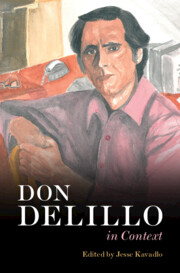Book contents
- Don DeLillo In Context
- Don DeLillo In Context
- Copyright page
- Contents
- Contributors
- Acknowledgments
- Abbreviations
- Introduction: Context, Content, Conflict
- Part I Places
- Part II History and Politics
- Part III Media and Pop Culture
- Part IV Literary Contexts
- Part V Material Contexts
- Part VI Social and Cultural Constructions
- Part VII Writing and Writers
- Chapter 29 The Concept of Authorship
- Chapter 30 The Writing Process
- Chapter 31 Advertising
- Conclusion: Don DeLillo’s Literary Legacy
- Further Reading
- Index
- References
Chapter 29 - The Concept of Authorship
Self/Referentiality
from Part VII - Writing and Writers
Published online by Cambridge University Press: 19 May 2022
- Don DeLillo In Context
- Don DeLillo In Context
- Copyright page
- Contents
- Contributors
- Acknowledgments
- Abbreviations
- Introduction: Context, Content, Conflict
- Part I Places
- Part II History and Politics
- Part III Media and Pop Culture
- Part IV Literary Contexts
- Part V Material Contexts
- Part VI Social and Cultural Constructions
- Part VII Writing and Writers
- Chapter 29 The Concept of Authorship
- Chapter 30 The Writing Process
- Chapter 31 Advertising
- Conclusion: Don DeLillo’s Literary Legacy
- Further Reading
- Index
- References
Summary
DeLillo has often been portrayed as a “reclusive author.” Even though this characterization of the man himself is not quite accurate, DeLillo’s work is rife with images of artists as solitary geniuses who eschew the spotlight. On a structural level, that image is manifested as well in how DeLillo himself rejects the postmodernist trend toward self-reflexivity and metafictional authorial intrusions. Instead, DeLillo’s work evinces the artistry of a distant but still controlling godlike author-figure, whom his characters can sense but not see.
Keywords
- Type
- Chapter
- Information
- Don DeLillo In Context , pp. 283 - 290Publisher: Cambridge University PressPrint publication year: 2022

